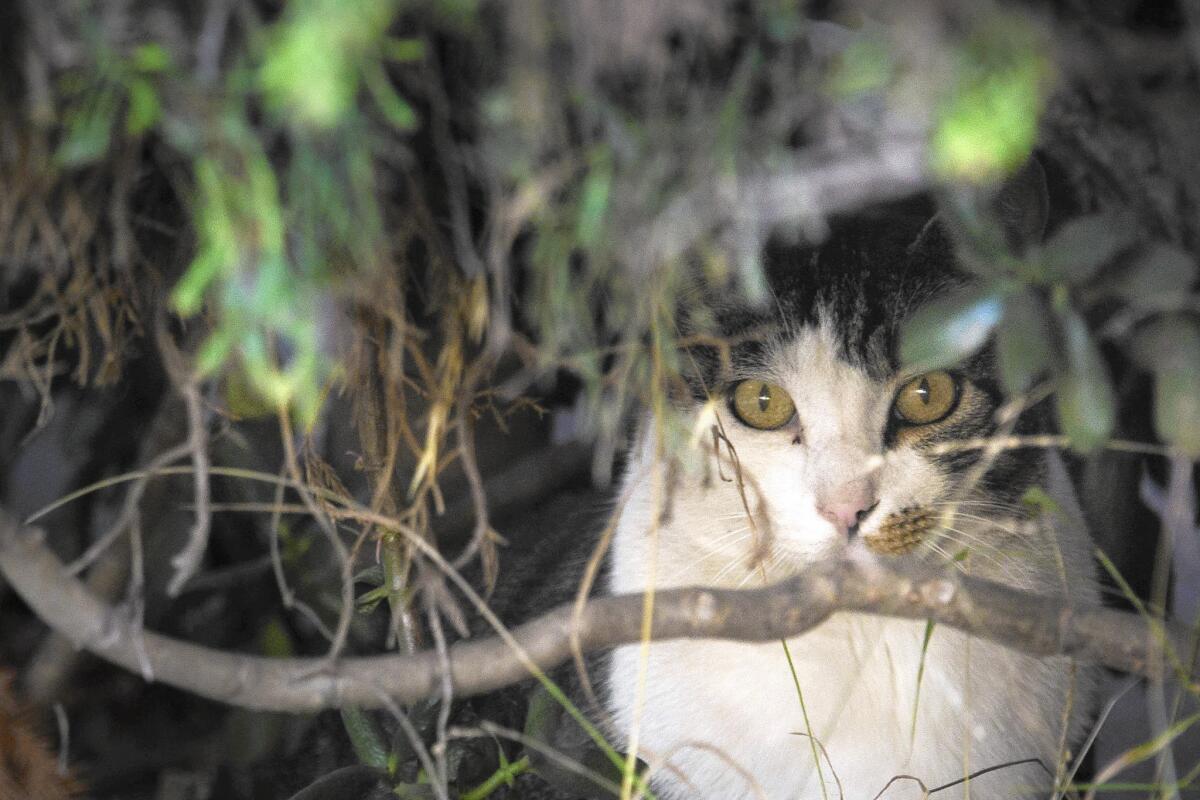L.A. County to weigh requiring pet cats to be spayed or neutered

- Share via
Los Angeles County officials will consider requiring cat owners to spay and neuter their pets, in hopes of reducing the population and, by extension, the number of cats killed in county shelters every year.
Supervisors Michael D. Antonovich and Hilda Solis proposed the new requirement for the approximately 1 million people living in county unincorporated areas, citing the disproportionately high number of cats euthanized.
They also want the county’s Department of Animal Care and Control to look for ways to provide subsidized spay-neuter services to cat owners.
If a stray dog or cat is brought to a county shelter, officials are legally required to hold it for a few days in case an owner wants to claim it. If no one does and the animal is not adopted, it can be killed to make room for others.
About 70% of cats brought into county shelters end up being killed, compared with 30% of dogs. Many of those animals are feral cats and unweaned kittens. The supervisors noted that the number of dogs coming into county shelters has declined by 60% over the last 40 years, while cat intake has gone down by only 30%.
The county already requires residents of unincorporated areas to spay and neuter their dogs, and provides vouchers to help pick up the cost for low-income dog owners. The city of Los Angeles requires both dogs and cats to be spayed.
“It is in the best interest of all parties — pet owners, taxpayers, and the animals — to reduce the numbers of unwanted or stray animals in need of care,” Antonovich and Solis wrote.
Antonovich spokesman Tony Bell said the proposal “will be a proactive first step to address the feral cat issue,” which Solis called a “quality-of-life issue.”
Animal welfare advocates gave the proposal mixed reviews. Karen Halligan, chief veterinary officer for the Lucy Pet Foundation, which operates mobile spay-neuter clinics, said requiring spay and neuter and providing low-cost services would be “a big step” toward improving outcomes for cats.
“It is just a death sentence for a cat if it ends up in the shelter,” she said.
The foundation recently added the county’s Baldwin Park and Downey shelters to its monthly mobile clinic circuit, but there are no county vouchers to defray the costs for cat owners.
A spokeswoman for the American Society for the Prevention of Cruelty to Animals said the group is “glad the county is examining options to save the lives of more of the community’s animals.” She added that “access to affordable and low-cost spay/neuter options and increased services for pet owners” should be “key components of any proposed plans.”
Christi Metropole, executive director of the Stray Cat Alliance, said mandates can backfire if they don’t come along with “free, easy-access” spay-neuter programs.
“What I believe the county supervisors need to do is really overhaul the way the county shelters work,” she said. Among other things, she said, the county needs a more “aggressive adoption program” for cats.
Halligan and Metropole said they want to see the county join other jurisdictions — including Long Beach and Orange County — that have implemented programs to trap, neuter and release feral cats instead of holding and euthanizing them. Supporters of the approach say it is more humane and reduces the population of homeless cats over time.
Los Angeles County officials, in conjunction with the ASPCA, are launching a limited free spay-neuter program for cats brought to the Baldwin Park and Downey shelters. But the county has been reluctant to adopt a broader policy of neutering and releasing feral cats.
“That’s a very controversial approach, and I think it’s still so new that we haven’t seen the long-term implications,” said Marcia Mayeda, director of the county’s Department of Animal Care and Control. She cited concerns about feral cats being returned to places where they would be at risk of disease or injury, or where they could threaten wildlife or pose a public health risk.
Mayeda said she supports the proposed mandate to neuter cats, which the supervisors are slated to consider at Tuesday’s meeting.
Twitter: @sewalla
More to Read
Sign up for Essential California
The most important California stories and recommendations in your inbox every morning.
You may occasionally receive promotional content from the Los Angeles Times.











